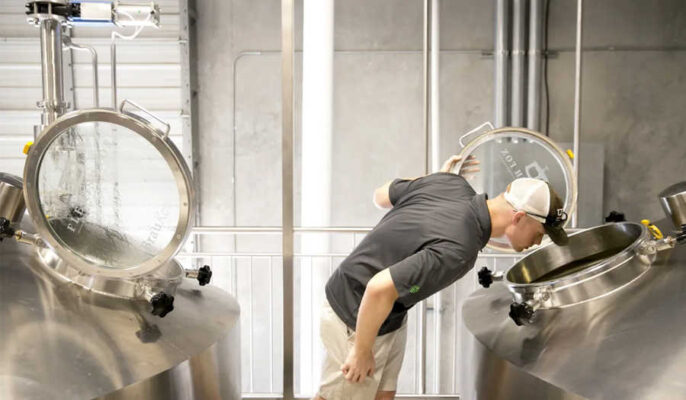Vaření piva je umění, ale pivovarnictví je spíše věda. Je zapotřebí specializovaných přísad, náročných teplot, dobře udržovaných strojů a maximální bezpečnosti. V každém odvětví je třeba věnovat zvláštní pozornost rizikům, která jsou s ním spojena, aby byla zajištěna bezpečnost zaměstnanců a zákazníků, a řemeslné pivovary a vinařství nejsou výjimkou.
Bezpečnost v pivovarnictví a lihovarnictví je klíčem ke snížení počtu pracovních úrazů a zranění. V tomto článku se zabýváme některými riziky, kterým čelí pracovníci pivovarů a lihovarů, a tím, co mohou zaměstnavatelé udělat pro zajištění bezpečného pracoviště.
Běžná bezpečnostní rizika v řemeslných pivovarech a pivovarech
Porucha zařízení
Pivovary používají k výrobě a skladování piva různá zařízení, od sudů po chladicí boxy. Pokud zařízení selže, může to vést k abnormálnímu stavu piva.
Bezpečnost stroje
Kontakt s částmi stroje může způsobit vážné nebezpečí. Dotek přístroje při čištění, nastavování nebo údržbě může vést k nehodám.
Problém s balením
Lahve na výčepní zařízení často trpí určitými problémy, například jsou rozbité, naštípnuté, což může vést ke kontaminaci nebo plesnivění piva.
Pracovní prostředí
zranění způsobená uklouznutím na mokré podlaze nebo přenášením předmětů. Častou příčinou úrazů jsou výpary uvolňované při vaření a destilaci a také nebezpečí způsobená chemickými látkami.
Nebezpečné chemické látky
Čistící rozpouštědla a dezinfekční chemikálie používané v pivovarech a lihovarech mohou způsobit drobná podráždění kůže až vážná poranění.

Dovednosti v oblasti řízení rizik
Pivovary a lihovary mohou podniknout určité kroky, které jim pomohou zvládnout rizika, jimž čelí. Správné řízení rizik může pomoci snížit prostoje zařízení, zlepšit výrobky, zvýšit bezpečnost zaměstnanců a přinést různé další finanční výhody.
- Mít řádné pojištění malé firmy
- Diskuse o rizicích s prodejci a dodavateli
- Vytvoření seznamu úkolů v oblasti zabezpečení
Bezpečnostní tipy pro zařízení na výrobu piva Micro Brewing
Udržujte konvici v čistotě
Čištění správnými chemikáliemi se správnou frekvencí je nedílnou součástí udržování zařízení v provozu. Teplota se ztrácí v důsledku usazování vodního kamene v konvici, což ovlivňuje rychlost odpařování piva a hustotu konvice.
Oprava malých úniků páry
Oprava malých netěsností nejenže zabrání nehodám, ale také zabrání poruchám drahých pivovarských kotlů.
Použití bezpečnostního listu
OSHA, vládní agentura, která reguluje bezpečnost na pracovišti, vyžaduje, aby zaměstnanci měli k těmto listům vždy přístup, a to z dobrého důvodu. V bezpečnostních listech jsou uvedeny chemické látky používané na pracovišti, jejich koncentrace, postupy bezpečné manipulace a způsoby likvidace po odstranění z kontaktu s lidmi.
Použití nového přípravku proti pěnění k zabránění varu
Na výrobu piva se používá více mladiny a tato piva mají vyšší obsah bílkovin, což v procesu vaření vytváří více pěny. Do várky se přidává prostředek proti pěnění, který zabraňuje vyvaření kotle a udržuje prostor bezpečný pro zaměstnance.
Připojte se k organizaci pivovarníků
Minipivovary se obávají o bezpečnost svých zaměstnanců, mohou najít podporu ve své pivovarské radě. Poskytuje informace a podporu o všech aspektech řemeslného piva.




